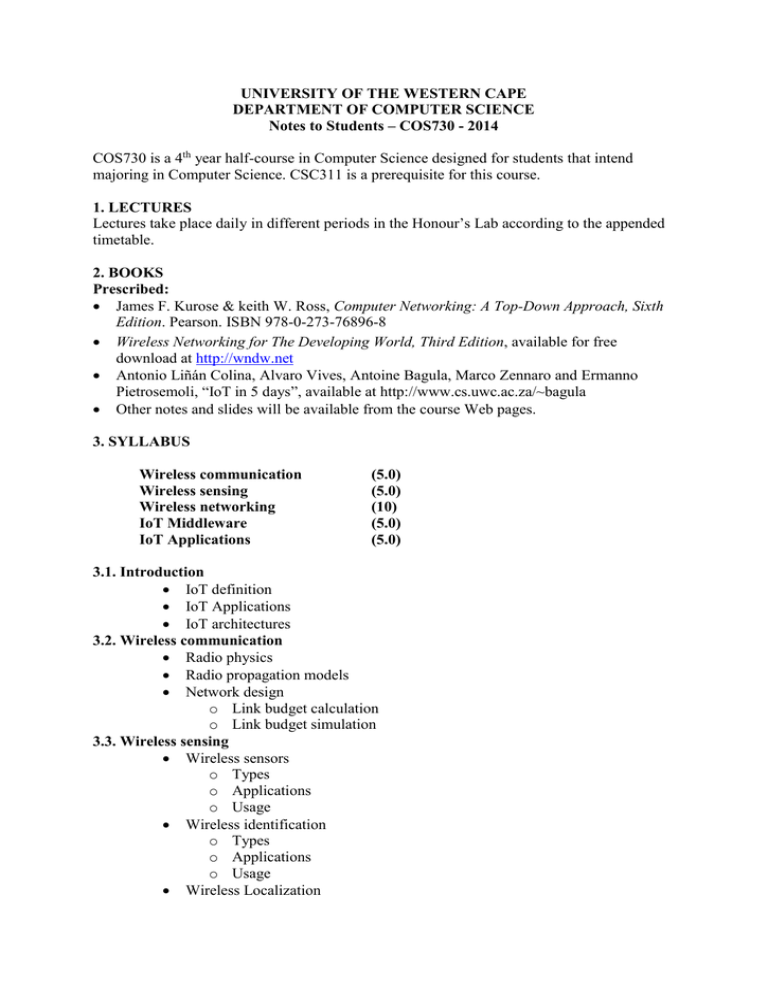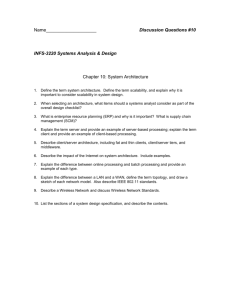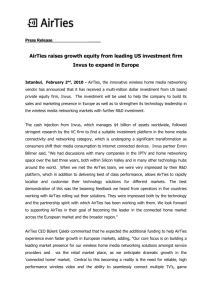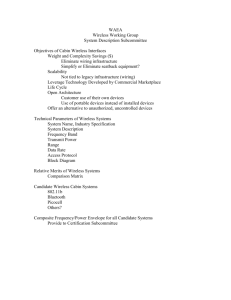Course/Lecture Handout
advertisement

UNIVERSITY OF THE WESTERN CAPE DEPARTMENT OF COMPUTER SCIENCE Notes to Students – COS730 - 2014 COS730 is a 4th year half-course in Computer Science designed for students that intend majoring in Computer Science. CSC311 is a prerequisite for this course. 1. LECTURES Lectures take place daily in different periods in the Honour’s Lab according to the appended timetable. 2. BOOKS Prescribed: James F. Kurose & keith W. Ross, Computer Networking: A Top-Down Approach, Sixth Edition. Pearson. ISBN 978-0-273-76896-8 Wireless Networking for The Developing World, Third Edition, available for free download at http://wndw.net Antonio Liñán Colina, Alvaro Vives, Antoine Bagula, Marco Zennaro and Ermanno Pietrosemoli, “IoT in 5 days”, available at http://www.cs.uwc.ac.za/~bagula Other notes and slides will be available from the course Web pages. 3. SYLLABUS Wireless communication Wireless sensing Wireless networking IoT Middleware IoT Applications (5.0) (5.0) (10) (5.0) (5.0) 3.1. Introduction IoT definition IoT Applications IoT architectures 3.2. Wireless communication Radio physics Radio propagation models Network design o Link budget calculation o Link budget simulation 3.3. Wireless sensing Wireless sensors o Types o Applications o Usage Wireless identification o Types o Applications o Usage Wireless Localization o Types o Applications o Usage 3.4. Wireless networking Protocol layering Link layer o 802.15.4/Zigbee o Bluetooth BLE o WiFi lite Network layer o RPL o CTP o LIBP Transport layer Application layer o COAP o MQTT 3.5. IoT middleware UbiDot ThingSpeak 3.6. IoT application BigData processing o MapReduce + Hadoop o Scala+Spark IoT Applications o UbiHealth o SmartEnergy o CitySafe 3.7. Course projects Project 1. Project 1.1. Network planning o Extend NetPlan to include indoor design with wall penetration resistance o Extend NetPlan to include different propagation models and climate effects Project 1.2. Wireless sensing o Early warning using z1 o Localization with OpenBeacon o Identification with BLE Project 2. Project 2.1. Wireless networking o 6LoWPAN addressing o RPL, CTP, LIBP o WireShark visualization Project 2.2. IoT middleware o Ubidot o ThingSpeak Project 3. Project 3.1. Big data o MapReduce + Hadoop o Scala + Spark Project 3.2. CitySafe 4. DEVELOPMENT ENVIRONMENT Part of the educational experience in honours in Computer Science is to ensure students can design computer systems and, using some of the available development tools, build these systems from scratch or through integration with existing software and hardware. Thus you will be required to undertake all your practical work using 1. Simulation/emulation tools provided for designing and testing wireless protocols and systems (RadioMobile and Cooja), 2. Hardware platforms such as a) z1 from Zolertia for sensor networking b) Raspery Pi and c) Alix platform from PCEngines for wireless mesh networking. 3. Implementation tools/middleware for IoT platforms These simulation/emulation tools and hardware platforms are available for different operating systems including Linux. 5. LABORATORY Students will have access to the Honours Laboratory of the Computer Science. While many of the practical works will be performed in groups of two students, each student is expected to spend the minimum number of hours required to complete his task. The equipment provided will always be adequate for students to perform the work of the course. Any additional facilities will be provided to enable each group to complete their tasks on time. The equipment provided for the practical is expensive and fragile. Should this equipment provided be abused, it can be withdrawn from any individual or the group as a whole without warning. 6. TUTORIAL LECTURES (Thursday 3rd period) On Thursdays, the second period lecture will be dedicated to tutorials to assist students in understanding the course work while the 3rd period will be devoted to the practical work. The tutorial and practical work period will be coordinated by the lecturer of the course in question and the teaching assistants and may include components like: A tutorial with in-class exercises and solutions based on the week’s work, Demos regarding current projects related to class work Group exercises A discussion of the practical set for the following week (where appropriate) 7. INDIVIDUAL AND GROUP WORK Most of the practical projects will be done in group, unless otherwise specified by the lecturer. 8. PRACTICAL WORK (Mon - Thurs afternoon) Practical work is one of the most important parts of the course. PLEASE NOTE: Extensions will only be granted on production of a Valid Medical Certificate signed by a qualified Medical Doctor or on compassionate grounds. Penalties for late assignments are 5% per day. Work more than 6 days late will NOT be accepted. To avoid plagiarism, do not submit material that is not your own work. 9. TESTS As part of the assessment, two tests will be given to the students during the duration of the course: one in mid-course and another at the end of the course. The two tests are scheduled on Tuesday 28th of April 2015 in Honour’s Lab. Wednesday 13th of May 2015 in Honour’s Lab. All class tests will be held during the scheduled lecture time, i.e. second period on Tuesday and 4th period on Wednesday; students should arrive 10 minutes before the beginning of the test. 10. EXAMINATION REQUIREMENTS All Practicals 50.0% Class Tests 30.0 % June Exam 20.0% Supplementary: 1 paper of 3 hours during the Re-assessment period. 11. MISSED CLASS TESTS Any student who misses a class test for Medical or Compassionate reasons will be required to either rewrite the test or to do an oral. The procedure to follow is: 1) It is the student’s responsibility to inform the Course Coordinator as soon as possible and no later than 3 days after the test. 2) A Medical certificate signed by a Medical doctor must be provided. In the case of Compassionate reasons please discuss this with the Course Coordinator. 3) The re-test must be done within 10 days of the test (or by the end of the week following the test) which ever date comes first. In the case of an extended Medical situation contact the Course Coordinator. 12. PLAGIARISM (COPYING) All forms of Plagiarism (programs, essays, tutorials etc.) are illegal and will be punished according to the University’s rules. These rules are severe and can lead to rustication. The Lecturer plans to check all program submissions to ensure that the work submitted has not been copied. Work by other authors must be acknowledged as such. 13. COURSE ADMINISTRATION Questions related to the material being lectured or tutorial work should be addressed to the course coordinator. If you have administrative queries related to marks, tests and so on, please raise these with the course convenor. Course Coordinator: Prof. BA Bagula, Room 1.28 e-mail: abagula@uwc.ac.za Tutors: Mr Claude Lubamba (MSc UWC): Wireless Sensor Network Mr Hope Mauwa (PhD UWC): Wireless Network Planning. Mr Zenville Erasmus (MSc UWC): Big Data + Cloud Computing Mrs Waleed Deneay (MSc UWC): Wireless Sensor Network 14. TUTORIALS The provisional plan for the assignments is given below. Tu Project Handout Handin Guaranteed Marked by 1 Project1 13 April 2015 20 April 2015 27 April 2015 2 Project2 20 April 2015 8 May 2015 15 May 2015 3 Project3 8 May 2015 28 May 2015 5 June 2015 t 15. COURSE LECTURE TIMETABLE COS730 TIMETABLE - 2015 LECTURES Week Date 1 06-Apr 2 13-Apr 3 20-Apr 4 27-Apr 5 04-May 6 11-May 7 18-May 8 25-May 9 01-Jun 10 08-Jun 11 15-Jun 12 22-Jun 13 29-Jun 14 06-Jul 15 13-Jul Monday Tuesday Public Holiday 10:50-11:50 10:50-11:50 10:50-11:50 10:50-11:50 10:50-11:50 Public Holiday Test 1 10:50-11:50 10:50-11:50 10:50-11:50 10:50-11:50 Assessment PRACTICALS Wednesday 10:50-13:00 10:50-13:00 10:50-13:00 10:50-13:00 10:50-13:00 Test 2 Thursday 10:50-13:00 10:50-13:00 10:50-13:00 10:50-13:00 10:50-13:00 Study Period Friday HAND-OUT HAND-IN PRAC1 PRAC2 PRAC1 PRAC3 PRAC2 Public Holiday PRAC3 Re-assessment Color Meaning Nothing Lecture Assessment Re-assessment Test







